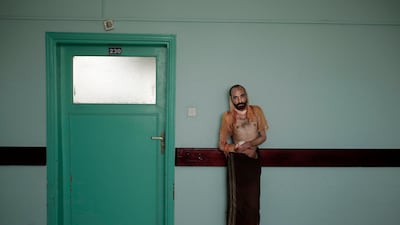Beaten with rods, drilled with power tools and left paralysed, the recent revelations of brutal torture of Yemeni detainees in Houthi rebel prisons has spurred one of the group’s top leaders, Mohammed Ali Al Houthi, to order an investigation.
While the rebel leader called the reported torture "not part of our norms or values", former detainees told The National of widespread, systematic abuse at the hand of their rebel captors.
Hasan Mohamed, 50, was detained by the Houthis for 8 months in a prison in Sanaa, the rebel-held capital. He describes being brutally beaten with iron rods and electrocuted. Now living in Aden, he showed his hands where the nails were ripped out.
"I didn't believe that I would be released from the Houthi hell alive, I was just awaiting my end," he told The National, looking down at the still raw wounds on his hands.
“The torture that I was exposed to in the Houthi prison is hard to describe. They put us in a very dirty detention [centre], living in the darkness with mice and bugs. They would keep us awake until the early hours without reason just as a tool of torture" he added
Jamal Al Maamari, 50, is another victim of for the Houthi torture. The Marib resident was released in April after two years in the Houthi detention in Sanaa but has been left with life-changing injuries. Mr Al Maamari is paralysed from the waist down as a result of repeated beatings.
"As soon as I entered the prison, they started hitting me on the head with their guns until I passed out," Mr Al Maamari says. "When I woke up the next day, I couldn't stand up because my spine was broken," he says.
"My clothes were torn and I was covered with my own blood."
Mr Al Maamari says the Houthi’s also beat, burned and electrocuted him as well as using an electric drill on his body.
"One time, a prison guard was burning my left leg [with a torch] until the skin started to melt off, so I asked him sarcastically whether he was hungry," says Mr Al Maamari.
"He retaliated by getting a drill and using it on my thigh.”
Basem Al Hakeemi from the Yemeni Ministry of Human Rights told The National that they have been working to document the crimes. He says they are compiling a catalogue of the brutal torture meted out by the Houthi militia to Yemeni civilians.
"We are co-operating with all the institutions working on human rights inside in the country and abroad, [but are] struggling to lead a campaign to expose the Houthi criminals and report the stories of victims for the international human rights organisations," he says.
But Mr Al Hakemi says he is confident people will see justice. “The Houthi thugs will not go without punishment, sooner or later they will be dragged to the courts."
The news of the brutal torture broke just ahead of Monday’s 70th-anniversary celebration of the International Declaration of Human Rights. At an event in Aden, Yemen’s minister for human rights, Mohammed Askar, says the Houthis are responsible for horrible violations against men, women and children.
_______________
Read more:
Iran not interested in Yemen peace, says US State Department official
Yemen’s warring parties meet for first direct talks since 2016
Houthi rebels reject government request to re-open Sanaa airport
_______________
"The ministry has documented stories of brutal torture, hundreds of innocent Yemenis have died in the Houthi detention centres and many died just a few days after their release," the minister says.
“The Houthis who committed such horrible crimes against the civilians will not go unpunished. Neither I nor the president or any other person could forgive those people and they will go to the courts to see punishment today or tomorrow."
On Friday, the Associated Press released a report based on testimony from 23 former detainees who said they survived or witnessed torture in Houthi prisons. Their relatives and lawyers, as well as activists and security officers, said they saw torture marks.
Some prisoners were burnt with acid, hanged from their wrists for weeks at a time or had their faces smashed with batons, an investigation by the Associated Press found.
The Abductees’ Mothers Union, an association of relatives of those held by the Houthis, documented the cases of more than 18,000 prisoners in the past four years.
These include 1,000 cases of torture in a network of secret prisons, said Sabah Mohammed, a representative of the group in the city of Marib.
The mothers’ group said at least 126 prisoners had died as a result of being tortured since the Houthis took over Sanaa in 2014.
One Yemeni doctor who was freed in December last year after his family paid $8,000 (Dh29,380), said he had helped a man who had been hanged by his genitals and another who had been burnt by acid.
These accounts underscore the significance of a prisoner swap reached in Sweden on Thursday at the start of UN-sponsored peace talks between the rebels and the Yemeni government.
As a trust-building measure, the two sides agreed to release several thousand prisoners, although details must still be hammered out.
In 2016 a committee to investigate reports of torture was set up and 13,500 prisoners were freed in its first three months.
UAE currency: the story behind the money in your pockets
'Midnights'
%3Cp%3E%3Cstrong%3EArtist%3A%3C%2Fstrong%3E%20Taylor%20Swift%26nbsp%3B%3C%2Fp%3E%0A%3Cp%3E%3Cstrong%3ELabel%3A%3C%2Fstrong%3E%20Republic%20Records%3C%2Fp%3E%0A%3Cp%3E%3Cstrong%3ERating%3A%3C%2Fstrong%3E%204%2F5%3C%2Fp%3E%0A
The smuggler
Eldarir had arrived at JFK in January 2020 with three suitcases, containing goods he valued at $300, when he was directed to a search area.
Officers found 41 gold artefacts among the bags, including amulets from a funerary set which prepared the deceased for the afterlife.
Also found was a cartouche of a Ptolemaic king on a relief that was originally part of a royal building or temple.
The largest single group of items found in Eldarir’s cases were 400 shabtis, or figurines.
Khouli conviction
Khouli smuggled items into the US by making false declarations to customs about the country of origin and value of the items.
According to Immigration and Customs Enforcement, he provided “false provenances which stated that [two] Egyptian antiquities were part of a collection assembled by Khouli's father in Israel in the 1960s” when in fact “Khouli acquired the Egyptian antiquities from other dealers”.
He was sentenced to one year of probation, six months of home confinement and 200 hours of community service in 2012 after admitting buying and smuggling Egyptian antiquities, including coffins, funerary boats and limestone figures.
For sale
A number of other items said to come from the collection of Ezeldeen Taha Eldarir are currently or recently for sale.
Their provenance is described in near identical terms as the British Museum shabti: bought from Salahaddin Sirmali, "authenticated and appraised" by Hossen Rashed, then imported to the US in 1948.
- An Egyptian Mummy mask dating from 700BC-30BC, is on offer for £11,807 ($15,275) online by a seller in Mexico
- A coffin lid dating back to 664BC-332BC was offered for sale by a Colorado-based art dealer, with a starting price of $65,000
- A shabti that was on sale through a Chicago-based coin dealer, dating from 1567BC-1085BC, is up for $1,950
UAE currency: the story behind the money in your pockets
If you go
Flights
Emirates flies from Dubai to Phnom Penh with a stop in Yangon from Dh3,075, and Etihad flies from Abu Dhabi to Phnom Penh with its partner Bangkok Airlines from Dh2,763. These trips take about nine hours each and both include taxes. From there, a road transfer takes at least four hours; airlines including KC Airlines (www.kcairlines.com) offer quick connecting flights from Phnom Penh to Sihanoukville from about $100 (Dh367) return including taxes. Air Asia, Malindo Air and Malaysian Airlines fly direct from Kuala Lumpur to Sihanoukville from $54 each way. Next year, direct flights are due to launch between Bangkok and Sihanoukville, which will cut the journey time by a third.
The stay
Rooms at Alila Villas Koh Russey (www.alilahotels.com/ kohrussey) cost from $385 per night including taxes.
Honeymoonish
%3Cp%3E%3Cstrong%3EDirector%3A%3C%2Fstrong%3E%20Elie%20El%20Samaan%3C%2Fp%3E%0A%3Cp%3E%3Cstrong%3EStarring%3A%20%3C%2Fstrong%3ENour%20Al%20Ghandour%2C%20Mahmoud%20Boushahri%3C%2Fp%3E%0A%3Cp%3E%3Cstrong%3ERating%3A%3C%2Fstrong%3E%203%2F5%3C%2Fp%3E%0A
Benefits of first-time home buyers' scheme
- Priority access to new homes from participating developers
- Discounts on sales price of off-plan units
- Flexible payment plans from developers
- Mortgages with better interest rates, faster approval times and reduced fees
- DLD registration fee can be paid through banks or credit cards at zero interest rates
The National in Davos
We are bringing you the inside story from the World Economic Forum's Annual Meeting in Davos, a gathering of hundreds of world leaders, top executives and billionaires.
Players Selected for La Liga Trials
U18 Age Group
Name: Ahmed Salam (Malaga)
Position: Right Wing
Nationality: Jordanian
Name: Yahia Iraqi (Malaga)
Position: Left Wing
Nationality: Morocco
Name: Mohammed Bouherrafa (Almeria)
Position: Centre-Midfield
Nationality: French
Name: Mohammed Rajeh (Cadiz)
Position: Striker
Nationality: Jordanian
U16 Age Group
Name: Mehdi Elkhamlichi (Malaga)
Position: Lead Striker
Nationality: Morocco
LEAGUE CUP QUARTER-FINAL DRAW
Stoke City v Tottenham
Brentford v Newcastle United
Arsenal v Manchester City
Everton v Manchester United
All ties are to be played the week commencing December 21.
Avatar%20(2009)
%3Cp%3E%3Cstrong%3EDirector%3A%20%3C%2Fstrong%3EJames%20Cameron%3C%2Fp%3E%0A%3Cp%3E%3Cstrong%3EStars%3A%20%3C%2Fstrong%3ESam%20Worthington%2C%20Zoe%20Saldana%2C%20Sigourney%20Weaver%3C%2Fp%3E%0A%3Cp%3E%3Cstrong%3ERating%3A%20%3C%2Fstrong%3E3%2F5%3C%2Fp%3E%0A
Killing of Qassem Suleimani
MOUNTAINHEAD REVIEW
Starring: Ramy Youssef, Steve Carell, Jason Schwartzman
Director: Jesse Armstrong
Rating: 3.5/5
How to watch Ireland v Pakistan in UAE
When: The one-off Test starts on Friday, May 11
What time: Each day’s play is scheduled to start at 2pm UAE time.
TV: The match will be broadcast on OSN Sports Cricket HD. Subscribers to the channel can also stream the action live on OSN Play.
More coverage from the Future Forum
Some of Darwish's last words
"They see their tomorrows slipping out of their reach. And though it seems to them that everything outside this reality is heaven, yet they do not want to go to that heaven. They stay, because they are afflicted with hope." - Mahmoud Darwish, to attendees of the Palestine Festival of Literature, 2008
His life in brief: Born in a village near Galilee, he lived in exile for most of his life and started writing poetry after high school. He was arrested several times by Israel for what were deemed to be inciteful poems. Most of his work focused on the love and yearning for his homeland, and he was regarded the Palestinian poet of resistance. Over the course of his life, he published more than 30 poetry collections and books of prose, with his work translated into more than 20 languages. Many of his poems were set to music by Arab composers, most significantly Marcel Khalife. Darwish died on August 9, 2008 after undergoing heart surgery in the United States. He was later buried in Ramallah where a shrine was erected in his honour.
AUSTRALIA SQUAD
Aaron Finch (captain), Ashton Agar, Alex Carey, Pat Cummins, Glenn Maxwell, Ben McDermott, Kane Richardson, Steve Smith, Billy Stanlake, Mitchell Starc, Ashton Turner, Andrew Tye, David Warner, Adam Zampa


